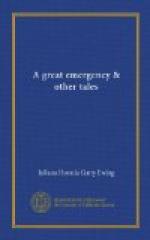I was rather sorry, too, that, bound by the strictest of injunctions from Rupert and my own promise, I had not been able, ever so casually, to make my new friends aware that among my other advantages was that of being first cousin to a peer, the very one who lived at the Castle. The Castle was a show place, and I knew that many of my schoolfellows were glad enough to take their friends and go themselves to be shown by the housekeeper the pictures of my ancestors. On this point they certainly had an advantage over me. I had not seen the pictures. Our cousin never called on us, and never asked us to the Castle, and of course we could not go to our father’s old home like common holiday-making townspeople.
I would rather not say very much about the next day. It must seem almost incredible that I could have failed to see that Weston and Johnson were making fun of me; and I confess that it was not for want of warnings that I had made a fool of myself.
I had looked forward to going to school with about equal measures of delight and dread; my pride and ambition longed for this first step in life, but Rupert had filled me with a wholesome awe of its stringent etiquette, its withering ridicule, and unsparing severities. However, in his anxiety to make me modest and circumspect, I think he rather over-painted the picture, and when I got through the first day without being bullied, and made such creditable friends on the second, I began to think that Rupert’s experience of school life must be due to some lack of those social and conversational powers with which I seemed to be better endowed. And then Weston’s acting would have deceived a wiser head than mine. And the nursemaids had always listened so willingly!
As it happened, Rupert was unwell next day and could not go to school. He was obviously afraid of my going alone, but I had no fears. My self-satisfaction was not undone till playtime. Then not a boy dispersed to games. They all gathered round Weston in the playground, and with a confident air I also made my way to his side. As he turned his face to me I was undeceived.
Weston was accustomed—at such times as suited his caprice and his resources—to give exhibitions of his genius for mimicry to the rest of the boys. I had heard from Rupert of these entertainments, which were much admired by the school. They commonly consisted of funny dialogues between various worthies of the place well known to everybody, which made Weston’s audience able to judge of the accuracy of his imitations. From the head-master to the idiot who blew the organ bellows in church, every inhabitant of the place who was gifted with any recognizable peculiarity was personated at one time or another by the wit of our school. The favourite imitation of all was supposed to be one of the Dialogues of Plato, “omitted by some strange over-sight in, the edition which graces the library of our learned and respected doctor,” Weston would say with profound gravity. The Dialogue was between Dr. Jessop and Silly Billy—the idiot already referred to—and the apposite Latin quotations of the head-master and his pompous English, with the inapposite replies of the organ-blower, given in the local dialect and Billy’s own peculiar jabber, were supposed to form a masterpiece of mimicry.




